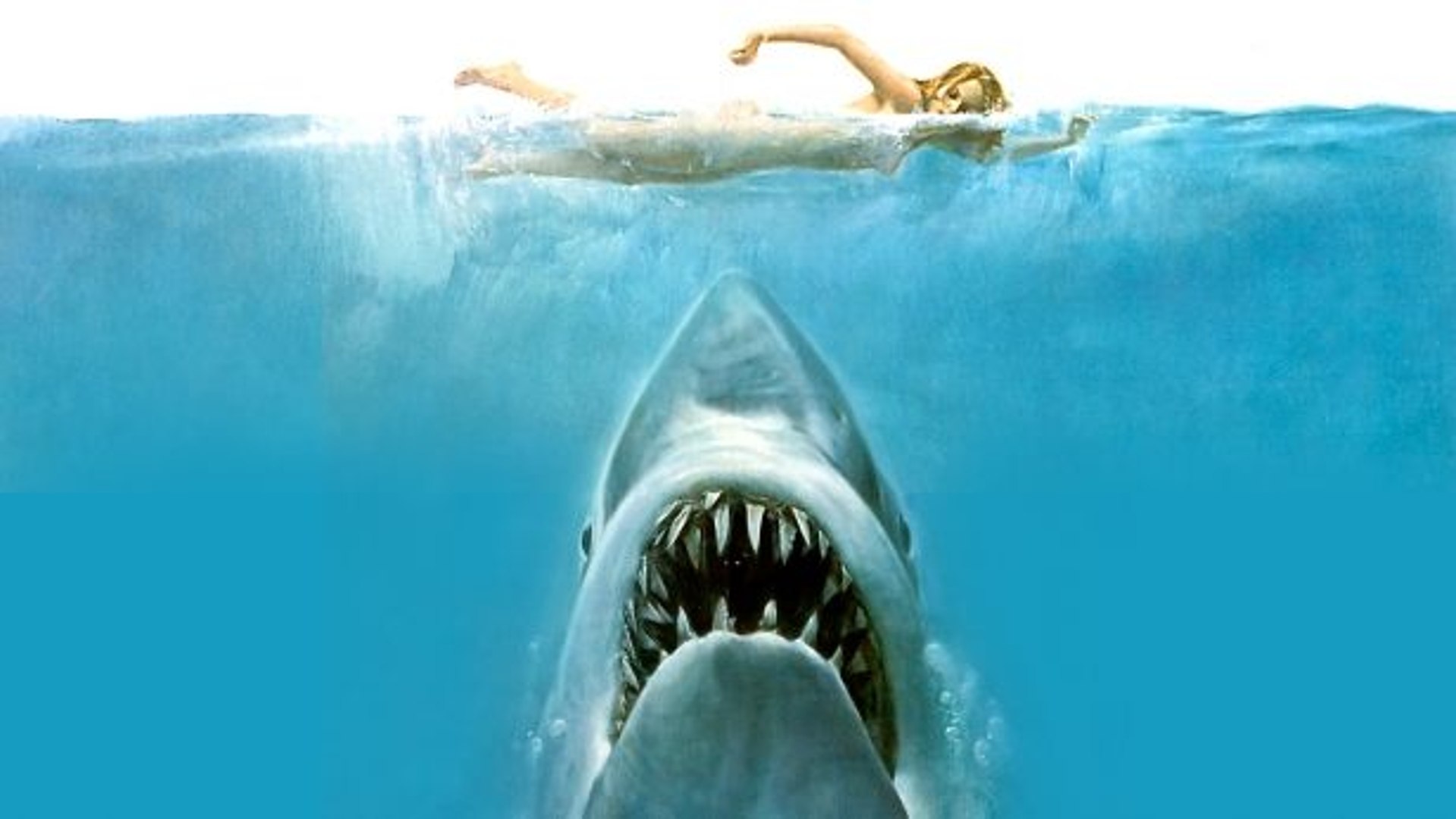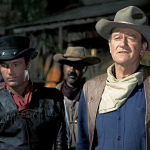🎥 Jaws (1975)

Review of Jaws (1975)
Directed by Steven Spielberg and based on Peter Benchley’s novel, Jaws (1975) is one of the most influential films in cinematic history. At its core, Jaws is a survival thriller about a great white shark terrorizing a small New England beach town, but its lasting impact goes beyond its genre. With its unforgettable characters, impeccable direction, masterful suspense, and groundbreaking technical achievements, Jaws not only set the standard for the modern blockbuster but also redefined the possibilities of what film could achieve in terms of emotional depth and visual storytelling. It remains a cultural touchstone, lauded for its ability to provoke fear, awe, and admiration, even nearly 50 years after its release.
Plot and Structure
The story of Jaws is deceptively simple: a massive great white shark begins to stalk the beaches of the small island town of Amity, resulting in several gruesome attacks. As the body count rises, the local authorities—led by the newly appointed police chief Martin Brody (Roy Scheider)—are faced with the moral dilemma of whether to close the beaches to protect the public or to allow the town’s summer tourist economy to continue unimpeded. With the mayor, Larry Vaughn (Murray Hamilton), under pressure to keep the beaches open, Brody is forced to take matters into his own hands.
As the shark’s attacks become more brazen, Brody recruits a marine biologist, Matt Hooper (Richard Dreyfuss), and a seasoned shark hunter, Quint (Robert Shaw), to hunt and kill the shark. What follows is a tense, thrilling, and often harrowing pursuit across the waters surrounding Amity, culminating in a battle of wits and willpower between the men and the beast. Along the way, the film explores themes of heroism, fear, and the fragility of human control in the face of nature’s might.
While the premise seems like a straightforward thriller, Jaws operates on multiple levels, using its simple story to explore deeper themes of survival, human hubris, and the unknowable forces of nature. Spielberg and screenwriter Carl Gottlieb masterfully balance the tension of the shark attacks with moments of humor, character development, and emotional depth, turning what could have been a one-note horror film into a multifaceted and profound cinematic experience.
Characters and Performances
One of the key reasons Jaws stands out as more than just a monster movie is the richness of its characters. Spielberg wisely chose to focus on the human drama surrounding the shark attacks rather than simply reveling in the spectacle of the predator itself. The film’s three central characters—Brody, Hooper, and Quint—serve as both comic relief and emotional anchors, providing the film with its heart and soul.
Chief Martin Brody (Roy Scheider)
Roy Scheider’s portrayal of Chief Martin Brody is one of the film’s standout performances. As the newly appointed police chief of Amity, Brody is an outsider, both in terms of his professional role and personal background. A man who is terrified of water (having been raised on landlocked Long Island), Brody’s fear of the shark is both personal and professional. His struggle to protect the townspeople, while battling his own terror of the ocean, makes him one of the most relatable and sympathetic characters in the film.
Brody’s character arc is one of transformation—he starts as a reluctant and somewhat cowardly leader, but over the course of the film, he evolves into a courageous and determined figure. His quiet heroism is exemplified in his final showdown with the shark, where he must face not only the creature but his own fears. Scheider’s performance anchors the film, and his ability to convey both vulnerability and strength ensures that Brody is much more than just the “everyman” figure.
Matt Hooper (Richard Dreyfuss)
Richard Dreyfuss plays Matt Hooper, the marine biologist who becomes Brody’s ally in the battle against the shark. Hooper is everything Brody is not: young, brash, and fearless in the face of danger. He brings a sense of scientific rationality to the investigation of the shark attacks, in contrast to Brody’s more instinctual approach. Dreyfuss injects the role with charm and wit, making Hooper an endearing and entertaining character. While Brody is initially skeptical of Hooper’s expertise, the two characters develop a camaraderie as they work together to hunt the shark.
Hooper’s dynamic with Brody adds a layer of humor and humanity to the film. While the stakes are high, the banter between the two men keeps the tension from becoming overwhelming, providing moments of levity that help balance the film’s darker elements. Hooper’s moments of vulnerability, particularly when he’s face-to-face with the shark, humanize him and make him more than just a scientist—he becomes a fellow human being struggling with his own mortality.
Quint (Robert Shaw)
Robert Shaw’s portrayal of Quint, the grizzled shark hunter with a dark past, is iconic. Quint is a man of contradictions: he’s both a relentless and highly skilled predator of sharks, but he also carries the emotional scars of his own experiences, particularly from World War II. Shaw brings a brooding intensity to the role, portraying Quint as a man who is obsessed with killing the shark—perhaps as a means of proving his own toughness and exorcising the demons of his past. His tragic backstory, revealed in the famous “Indianapolis speech,” adds emotional weight to the character and makes his eventual fate all the more tragic.
Quint’s rivalry with Brody and Hooper provides much of the film’s tension. While Brody and Hooper approach the shark from a more intellectual and protective standpoint, Quint sees it as a personal challenge, a battle between man and nature. Shaw’s performance as Quint is intense, captivating, and often chilling, and it serves as one of the film’s most memorable aspects.
Themes: Fear, Survival, and Humanity’s Relationship with Nature
At its surface, Jaws is a story about a giant shark terrorizing a small town. But beneath that simple premise, Spielberg and his collaborators have woven a narrative that delves into much deeper themes, particularly the human experience of fear and survival.
Fear and the Unknown
Fear is perhaps the most central theme of Jaws. The film plays on the primal fear of the unknown, using the shark as a symbol of nature’s unpredictable and uncontrollable power. The shark is not just a physical threat; it represents the mysterious and terrifying forces of the natural world that humans cannot fully comprehend or control. The townspeople’s fear of the shark escalates as they confront the reality that they are powerless against a predator that operates outside of their understanding and experience.
Spielberg capitalizes on this fear by often keeping the shark out of sight. In many of the film’s most suspenseful moments, the audience only hears the shark or sees the ominous fin cutting through the water, building a sense of dread without the need for constant on-screen violence. This decision to withhold the full reveal of the shark until later in the film creates a sense of tension that grows with each passing moment, drawing on the viewer’s imagination to amplify the horror.
The film also explores the psychological impact of fear. Brody’s anxiety and reluctance to confront the shark are not just based on his lack of knowledge about marine life—they are rooted in his fear of the ocean and its unknowable depths. The film shows that the real danger is not just the shark, but the fear itself, which can paralyze and prevent people from acting.
Survival and Human Hubris
Another key theme in Jaws is the struggle for survival. The shark’s relentless attacks force the characters to confront their mortality and make difficult decisions. This survival narrative is often framed in opposition to human hubris—the belief that humans can control or subdue nature. Brody, Hooper, and Quint all have their own ways of dealing with the shark, but it’s clear that none of them are fully prepared for the scale of the threat. Quint, in particular, embodies this sense of hubris, as he believes his experience and skills make him invincible. However, the film ultimately demonstrates that nature is unpredictable, and even the most experienced human beings can be overpowered by forces beyond their control.
The film’s message is one of humility—both towards nature and towards each other. Brody’s final victory over the shark is not a triumphant moment of conquest; it’s a simple act of survival. By the end of the film, Brody, Hooper, and Quint are all humbled by the experience, having come to understand that they are small in comparison to the vast, unknown forces of the world.
Cinematography and Direction
One of the defining aspects of Jaws is its masterful direction by Steven Spielberg. Spielberg’s ability to build tension, create suspense, and deliver emotional payoffs was revolutionary for a thriller of this kind. The film’s pacing is impeccable, moving from the slow burn of the shark’s initial attacks to the more urgent and action-packed final act. Spielberg uses a variety of techniques to build suspense, such as the iconic musical score by John Williams, which has become synonymous with the idea of impending danger. The film’s cinematography, led by Bill Butler, also plays a key role in heightening the tension, particularly with the underwater shots and the limited visibility in the water, which mirrors the characters’ own inability to fully grasp the threat they face.
Spielberg’s decision to limit the shark’s screen time was a stroke of genius. The shark itself, designed by special effects expert Robert Mattey, proved to be temperamental and often malfunctioned during filming. As a result, Spielberg was forced to rely on suspense, sound design, and visual cues to build the threat, and this only made the shark’s eventual reveal more effective.
Cultural Impact and Legacy
Upon its release, Jaws became a massive commercial success, earning over $470 million worldwide (a staggering sum for its time). It is widely regarded as the first true “summer blockbuster,” pioneering the concept of wide-release marketing, and setting the template for the future of Hollywood blockbusters. Its success also cemented Spielberg’s status as one of the most influential directors of his generation.
Jaws has since become a cultural touchstone, referenced and parodied in countless films, television shows, and popular media. The film’s combination of heart-pounding thrills, rich character development, and subtextual depth has made it not only a cornerstone of the thriller genre but also one of the greatest films ever made.
Conclusion
Jaws (1975) is a masterpiece of cinema that transcends the boundaries of its genre. While it remains an exemplary thriller and a defining example of Spielberg’s early filmmaking, its impact goes far beyond its technical achievements. With its complex characters, exploration of fear and survival, and masterful direction, Jaws is a film that remains as relevant, thrilling, and thought-provoking today as it was upon its release. It is a testament to the power of cinema to not only entertain but to provoke deep emotional and intellectual engagement, and it continues to stand as one of the greatest films ever made.










